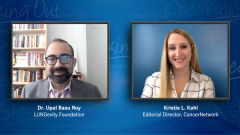
Small Cell Lung Cancer
Kristie L. Kahl: What is the difference between a small cell lung cancer and a non-small cell lung cancer diagnosis?
Dr. Upal Basu Roy: As we know, lung cancer is an incredibly complex disease. In fact, it's a collection of different types of diseases. And the two broad groups of lung cancer are small cell lung cancer and non-small cell lung cancer. Traditionally, what we thought of as small cell lung cancer was based on the fact that these cancers looked very different under the microscope. In fact, small cell lung cancer was known as auto cell cancer in the past, because when you looked at these cells under the microscope, they looked like little grains of oats, and all the other lung cancers were classified as non-small cell lung cancer.
But today, thanks to the advances in our understanding of the biology of these diseases, we do know that small cell lung cancer is fundamentally different from non-small cell lung cancer, not just by how it looks under the microscope, but also how these cancers behave. And small cell lung cancers are also known as neuroendocrine tumors – neuro meaning that these cancers produce proteins that are often found in our brains and in our nervous system and endocrine meaning that these cancers can secrete hormones, just like our endocrine glands.
Kristie L. Kahl: We hear about the fact that small cell lung cancer is different in the fact that it's fast growing. Can you explain what that means?
Dr. Upal Basu Roy: Lung cancer is an incredibly fast =-growing disease. And we call it aggressive and fast growing because of two reasons. First, when you think of low-density CT screening, which is used to detect lung cancer, we know that small cell lung cancer is typically not detected through low density CT screening because it grows so quickly that you sometimes miss small cell lung cancer when you go from one scan to another. The second reason why we call it a very aggressive diseases is because of the fact that, traditionally, chemotherapy has been used to treat small cell lung cancer. And initially when you treated these cancers, the small cell lung cancer used to literally melt away. They used to vanish in response to the chemotherapy, but equally aggressively, the cancers came back. So, despite this initial response to chemotherapy, the cancer came back really quickly. And because of this reason, we call it a very fast -growing and aggressive type of lung cancer.
Kristie L. Kahl: How has chemotherapy been a mainstay in small cell lung cancer?
Dr. Upal Basu Roy: Chemotherapy has been incredibly important in the treatment of small cell lung cancer for the past 20 years. Now, again, when we think of small cell lung cancer, it's divided into early-stage and late-stage small cell lung cancer. When we think of early-stage small cell lung cancer, chemotherapy is used in combination with radiation and it's called chemoradiation. And sometimes chemotherapy is also used after surgery in small cell lung cancer in early-stage small cell lung cancer. Now, when we're thinking of advanced or late-stage small cell lung cancer, chemotherapy is often the main treatment that is given to patients after they're diagnosed with small cell lung cancer.
Kristie L. Kahl: How have surgery and radiation also played a role in treatment?
Dr. Upal Basu Roy: Surgery/radiation plays a critical role in the treatment of small cell lung cancer. Again, when we think of early-stage small cell lung cancer surgery, sometimes we used to remove a piece of the lung where the tumor is localized. And this is applicable only for really early-stage small cell lung cancer where the tumor is confined to one lobe of the lung. Now, when we think of radiation therapy, radiation therapy is used both for early stage as well as late stage small cell lung cancer. Now, in early-stage small cell lung cancer, radiation may sometimes be applied to the same area of the chest after chemotherapy to make sure that the cancer does not come back. But equally important is something called PCI or prophylactic cranial irradiation. Now in early-stage small cell lung cancer patients often do not have brain metastases, but very often, their oncologist will suggest that they get PCI, which is radiation to the brain to make sure that future metastases do not occur and hence the term prophylactic to make sure that you can stop future metastasis in the brain from occurring.
Now in terms of late-stage small cell lung cancer, again, radiation is very often applied to the same area of the tumor where after chemotherapy to make sure that the cancer is limited. But again, radiation is also used to relieve pain from bone metastasis, which is very common in small cell lung cancer. So, radiation is used in two ways to actually treat the cancer and also to improve the symptoms such as bone pain associated with small cell lung cancer.
Kristie L. Kahl: What do we know about immunotherapy for small cell lung cancer?
Dr. Upal Basu Roy: That is a fantastic question. If you'd asked me this question two years ago, I would have had a very different answer as we speak in 2021. Immunotherapy is becoming an important component of treating advanced age or late stage small cell lung cancer. As of now we have two immunotherapy combinations. And when I say combinations, I mean immunotherapy combined with chemotherapy to treat first-line small first-line advanced small cell lung cancer. Essentially, the first treatment that an advanced small cell lung cancer patient will receive. So immunotherapy is definitely becoming an important component of treating small cell lung cancer. And we're also seeing a lot of clinical trials in early-stage small cell lung cancer to see how immunotherapy can be used in early-stage diseases. So, I see immunotherapy becoming an important piece of the small cell lung cancer treatment journey.
Kristie L. Kahl: With all these treatment options and modalities, why is the multidisciplinary approach really important for small cell lung cancer patients?
Dr. Upal Basu Roy: That's an excellent question. And when we think of multidisciplinary care, we don't actually think of it in the context of small cell lung cancer. But again, it's becoming more and more important for small cell lung cancer because of the fact that multiple health care providers or multiple treating physicians will interact with the small cell lung cancer patient. For example, you'll have the medical oncologist very often who's going to decide the chemotherapy or immunotherapy regimen, then you'll have the radiation oncologist who's going to be deciding what type of radiation a patient should receive, whether it's going to be to the brain or whether it's going to be to the bones or whether it's going to be to the chest. And of course, in early-stage lung cancer, you'll also have a surgical oncologist who will be consulting with the patient to decide what type of surgery is recommended. But I think a fourth piece here is also palliative care physicians, because we must keep in mind that small cell lung cancer itself is a very aggressive disease, and it has a high symptom burden. And also, some of the treatments themselves come with a lot of side effects. And therefore, I feel a palliative care physician should be a part of this multidisciplinary team to make sure that both symptoms of the disease as well as side effects of the treatment are taken care of.
Kristie L. Kahl: What do patients with small cell lung cancer have to look forward to in the treatment landscape?
Dr. Upal Basu Roy: This is an incredibly exciting time for small cell lung cancer treatment. And this is because of the fact that again, if you'd asked me this question a few years ago, I would have given you a very different answer. But now we have a very, very deep understanding of the biology of small cell lung cancer. And this understanding of the biology is now finally translating into treatment. And one of the ways in which this is happening is again, we still think even small cell lung cancer as one disease. But that's changing right now. And we are learning that all small cell lung cancers are not the same. And the concept of biomarkers, the concept of precision medicine is entering the small cell lung cancer space. And I'll give you a very good example of that. In fact, LUNGevity Foundation is proud to have spotted some of the researchers who have actually discovered that immunotherapy, for example, may not be beneficial for all small cell lung cancer patients and may work really, really well for a group of small cell lung cancer patients. And I think this, this particular fact itself is going to change how we treat small cell lung cancer patients, moving away from that one size fits all. And the other piece, which is equally important as we are developing better drugs to be able to target some of these biomarkers that we are discovering. So, I think to summarize, what I see happening is the treatment of small cell lung cancer is going to become incredibly personalized in the next couple of years.






